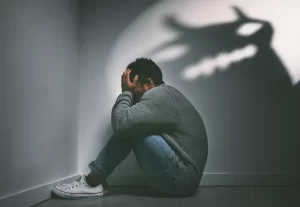
Trauma can lead to profound mental health challenges for anyone. It can stem from various sources and, later in life, may manifest in different forms. However, the way trauma impacts individuals can vary significantly between men and women, influenced by a complex interplay of social, cultural, and biological factors.
How Does Trauma Show Up In Men?
Trauma in men often manifests in complex ways, with specific habits or traits easily misunderstood or overlooked. Societal expectations pressure men to be stoic, strong, and emotionally reserved. These cultural norms can make it difficult to acknowledge and address male trauma. Thus, specific issues demand special attention and understanding.
Irritability
The most common way trauma shows up is through irritability. Men with PTSD find themselves getting agitated, overwhelmed, and disorganized over what may appear as seemingly minor things to others. If you find yourself or someone you love often having disagreements and arguments, it is essential to understand that this may be more than just a phase and more of a response to potentially unresolved trauma that is bubbling up under the surface and needs treatment.
Increased Substance Use
Male trauma often leads to increased substance use, as men may turn to drugs, alcohol, or smoking to find temporary relief from overwhelming feelings. By continually numbing the pain and seeking an escape from emotional distress, those who use substances risk exacerbating their trauma and potentially trapping themselves in a cycle of dependency and addiction.
Difficulty sleeping
Another way men might recognize trauma affecting their daily lives is through poor sleep. Men often struggle with sleep deprivation because of work schedules or other stressors, finding it hard to get the rest they need. Over time, this can lead to severe issues like insomnia. These sleep disturbances indicate that the mind is subconsciously dealing with unresolved emotional issues.
You or someone you know might be experiencing these issues, yet many people blame their daily stressful routines rather than recognizing sleeping disorders as a sign of something more. It’s also possible that these individuals are dealing with a medical issue.
Paranoia or Intense Fear
Trauma can manifest in various ways, and some men may experience symptoms of post-traumatic stress disorder (PTSD). These symptoms could include heightened fear or anxiety around specific objects or situations that remind them of their past trauma. In some instances, individuals might become hypervigilant and constantly on the lookout for potential threats.
It’s essential to recognize that trauma affects each person differently, and not all men with a history of trauma will exhibit the same behaviors or reactions. The impact of childhood trauma can be long-lasting, potentially influencing an individual’s ability to cope with daily stressors, establish trust, and build healthy relationships. Seeking professional help and guidance can be crucial in addressing and managing these challenges.
Impulsivity
A way trauma might show itself is through impulsivity. Impulsivity occurs when a person acts without thinking through the consequences. For men dealing with trauma, this can lead to impulsive behavior as they try to regain a sense of control. Whether it is sudden decisions, reckless actions, or even making spontaneous purchases, these behaviors are often a reaction to the overwhelming loss of control that trauma brings. In an unpredictable and threatening world, acting impulsively may offer a brief moment of power, but it may also be a cry for help.
What Are Common Traumatic Events For Men?
Trauma can affect anyone regardless of gender. However, specific experiences can particularly impact men, shaping their emotional and psychological well-being.
Fighting in wars
Fighting in wars has a profound impact on all who serve, but the effects can be particularly severe for men due to their higher participation rates and the nature of their combat roles.
Statistically, men make up the majority of military personnel in most countries, which means they are more frequently exposed to the extreme stressors and traumas of warfare. In the United States, men accounted for over 80% of active-duty military personnel in recent years. Research additionally shows that male veterans are also at a 1.5 times higher risk of suicide compared to their civilian counterparts and female veterans. The constant threat of danger, witnessing the deaths of comrades, and the necessity of taking lives can leave lasting scars in the form of PTSD, depression, and anxiety.
Witnessing injury or death
Men and women who witness injury or death can both experience intense emotional distress, but men may be more likely to suppress these feelings due to societal expectations of stoicism. Women, on the other hand, may be more likely to express their emotions openly and seek support from others, which can be a protective factor against long-term psychological effects.
Suffering violent attacks
Men and women both suffer from violent attacks, but the impact can differ due to societal roles and expectations. Men who are the victims of the majority of violent crimes may experience feelings of emasculation and shame. Moreover, societal pressures and traditional gender norms can create a perceived stigma around male vulnerability, making it even more difficult for these men to open up about their experiences or seek the necessary support for their emotional well-being.
Living through fires and disasters
Natural disasters, like fires, floods, or earthquakes, can be traumatic. For many men, these events can be even more stressful because society expects them to protect their families. After the event, if they cannot provide, it can lead to feelings of inadequacy or failure if they perceive themselves as not meeting these expectations. The damage to homes, loss of belongings, and overall chaos can cause severe stress and long-lasting emotional problems.
Experiencing accidents
Men often experience accidents in high-risk jobs or activities, which can contribute to feelings of guilt or failure, mainly if they are unable to return to work. Women, who may also suffer from accidents, often face different societal pressures. However, as the societal expectations differ for both, their experiences and recovery differ.
Loss of a child
The loss of a child is universally devastating, but men and women often grieve differently. Men might feel pressured to remain strong and composed, sometimes neglecting their grief to support their partner. As society deems men to be protectors, they might process this event as their inability to protect or support their family. Such a situation can potentially lead to marital issues and avoidance of close relationships.
Divorce
The societal stigma around divorce can impact men and women differently, influencing their coping strategies and long-term recovery. Some men even face financial instability due to the division of property and assets. Additionally, men might experience feelings of isolation and loneliness post-divorce, as they may be less likely to lean on their support networks or seek emotional guidance compared to women, leading to a potentially slower and more challenging recovery process.
Infidelity
Infidelity can be a significant source of emotional trauma for men and women, leaving the betrayed partner to grapple with immense distress. Discovering that a partner is untrustworthy often leads to intense feelings of anger, betrayal, and self-doubt. This kind of traumatic event can cast a long shadow over future relationships and alter one’s self-perception. The emotional fallout from infidelity can be profound and enduring, making it crucial for men to process these complex emotions in a safe and supportive environment.
Sexual abuse
Sexual abuse, unfortunately, is not widely recognized against men. To this day, countries exist where rape is only constituted against women as a crime. Furthermore, societal norms often inappropriately endorse that men always enjoy sexual activities and that being a victim is a blow to their masculinity. Thus, many male victims of sexual abuse choose to remain silent.
This stigma can exacerbate feelings of shame, guilt, and isolation. The psychological effects of sexual abuse can be severe and long-lasting, impacting a man’s ability to form trusting relationships and maintain intimacy. Overcoming sexual trauma requires comprehensive support and professional therapy.
How Can You Tell If a Man Has Experienced Traumatic Events?
If you’re concerned about a friend, partner, or relative and suspect they might be dealing with trauma, here are some signs to look for:
- Anger
Watch for increased irritability or outbursts of anger. If a man seems more easily frustrated or angry than usual, it could be a sign of underlying trauma.
- Increased Substance Use
Notice if there’s a rise in alcohol or drug use. This behavior often signals a need for support and intervention. Please encourage them to book a counseling session or rehab.
- Behavior Changes
Look for significant changes in behavior, like being withdrawn, avoiding social interactions, or exhibiting erratic behavior.
- Heightened Sensitivity
Pay attention to signs of heightened sensitivity. If they react more strongly to situations or comments than they used to, this increased sensitivity might reflect trauma-related stress.
- Intrusive Memories
Be aware of signs that a man is experiencing intrusive memories. If he frequently seems distracted, preoccupied, or distressed by memories of past events, it could be a sign of trauma.
- Nightmares
Consider if he reports frequent nightmares or disturbed sleep. Nightmares related to traumatic experiences can impact his sleep quality and overall well-being, indicating he may need support.
If you notice these signs in someone close to you, encouraging them to seek professional help can be a crucial step toward their recovery.
Where Do Men Commonly Store Trauma In Their Bodies?
Trauma can show up in a man’s body in several ways. Usually, it causes chronic pain, muscle tension, fatigue, and sleeping problems. It can also manifest as gastrointestinal or cardiovascular issues due to anxiety and depression being involved.
Generally, men store trauma in their :
- Shoulders and neck: Chronic tension and stiffness.
- Chest: Tightness or discomfort, sometimes mistaken for heart issues.
- Lower back: Persistent pain or stiffness.
- Stomach and gut: Digestive problems such as stomach pain or ulcers.
- Jaw: Clenching or grinding, resulting in jaw pain.
- Hips: Tightness or pain that affects mobility.
- Hands and forearms: Tension or strain from clenching.
Identifying these physical signs is essential for addressing them.
Do Men Process Trauma Differently Than Women?
Men and women often process trauma differently due to a combination of biological, psychological, and societal factors. Men are more likely to exhibit externalizing behaviors such as aggression and substance abuse, while women might display internalizing symptoms like depression and anxiety. This divergence is partly rooted in hormonal differences and brain structure variations that influence emotional processing and stress responses.
Psychologically, men are often socialized to adhere to traditional masculine norms, which can discourage them from expressing vulnerability and seeking help. This societal expectation can lead men to suppress their emotions, resulting in delayed or unrecognized trauma responses.
Societal and Cultural Influences Further Shape how Trauma is Processed and Expressed.
Men might feel pressured to conform to the stereotype of emotional stoicism, which can exacerbate feelings of isolation and difficulty in addressing their trauma. Women, on the other hand, may have more societal support and validation for expressing their emotional struggles, making it somewhat easier for them to seek help and engage in therapy. However, research also indicates that women are generally more deeply affected by traumatic events compared to men. For instance, while 1in 5 men may develop trauma, the rate is higher among women, with 2 to 3 out of every 5 experiencing significant trauma.
Both men and women face unique challenges, and effective treatment requires understanding these gender differences to provide tailored support that addresses their specific needs and experiences.
Does That Mean Men Need A Different Kind Of Therapy To Recover?
Yes, men do need a different approach to therapy to address their unique needs. Therapy should be tailored to address the specific issues men face and encourage them to handle their trauma in more effective ways.
How I Help Men Heal From Trauma
Therapy provides a safe and neutral space to address and explore the underlying issues of trauma. It offers a chance to develop healthier communication skills and process emotions that may be difficult to express. Seeking therapy is not a sign of weakness but a proactive step toward personal growth and improved relationships.
Addressing male trauma requires a sensitive approach, constructive dialogue, and practical strategies tailored to each individual’s needs. If you or someone you know is struggling with communication or emotional challenges due to past trauma, you will find I offer a supportive environment where you can be heard and understood. Reaching out for professional help can be crucial for healing and better emotional well-being. To begin your journey, schedule a session with me.
- Schedule A Therapy Session With Stefanie
Take the first step toward a healthier, more fulfilling life today!




